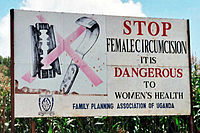
Photo from wikipedia
Introduction Female genital mutilation (FGM) is a significant global health concern and is likely to become an increasingly important healthcare challenge in destination countries such as the UK owing to… Click to show full abstract
Introduction Female genital mutilation (FGM) is a significant global health concern and is likely to become an increasingly important healthcare challenge in destination countries such as the UK owing to rising levels of migration from FGM-affected countries. Currently, there is no consensus on the optimal timing of deinfibulation (opening) surgery for women who have experienced type 3 FGM and care provision remains suboptimal in the UK. This qualitative study aims to explore the views of survivors, male partners and healthcare professionals (HCPs) on the timing of deinfibulation and delivery of NHS FGM services. Methods and analysis A qualitative study, informed by the Sound of Silence conceptual framework, will be undertaken via two work packages (WPs). WP1 will explore views on timing preferences for deinfibulation and NHS FGM services through interviews and discussion groups with FGM survivors (n~50), male partners (n~10) and HCPs (n~50). WP2 will use established techniques via two workshops (community (n~20–25 participants) and national stakeholder (n~30–35 participants)) to synthesise qualitative research findings and inform best practice and policy recommendations around the timing of deinfibulation and NHS FGM care provision. Supported by trained interpreters, data collection will be audio recorded and transcribed. Data will be analysed using the framework method to facilitate a systematic mapping and exploration of qualitative data from multiple sources. Ethics and dissemination The study has received ethical approval from the North West Greater Manchester East Research Ethics Committee (18/NW/0498). The outputs for this study will be recommendations for best practice and policy around FGM care provision that reflects the views and preferences of key stakeholders. The findings will be disseminated via conference presentations, peer-reviewed publications, patient groups, third sector organisations and social media. Trial registration number ISRCTN14710507.
Journal Title: BMJ Open
Year Published: 2019
Link to full text (if available)
Share on Social Media: Sign Up to like & get
recommendations!